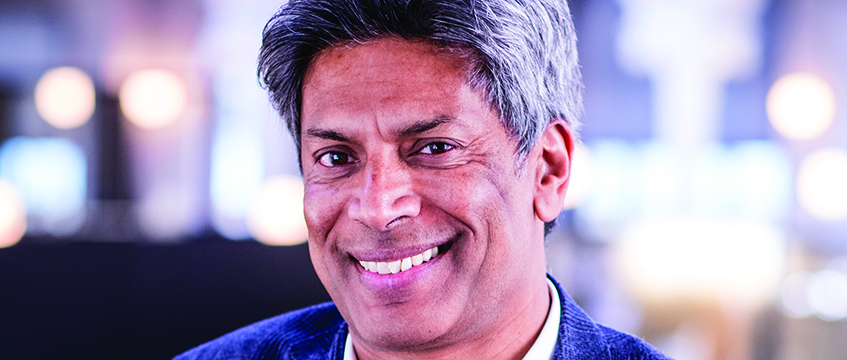D&D London’s Des Gunewardena has overseen the opening of some of London’s best-known restaurants. Now he’s looking for opportunities outside the capital, and across the pond
On one of the hottest days of the year so far, the network of construction sites surrounding Land Securities’ Nova development in Victoria, SW1, is more imposing than usual. But somehow, despite being almost entirely engulfed in choking clouds of dust and against the backdrop of the deafening whirr of multiple industrial drills, hospitality operator D&D London’s latest restaurant is the calm in the midst of the storm.
Aster, the operator’s new Nordic-French restaurant, has attracted a crowd despite being tucked away in the middle of a hard-to-navigate enclave of London with minimal passing trade and very little natural footfall. The whole area surrounding Victoria Station is currently a veritable maze of construction works, diversions and dead-ends, making it nigh on impossible to beat an easy path to the restaurant; or indeed to Nova at all.
But this is the type of site that D&D’s chairman and chief executive Des Gunewardena lives for. Sitting outside Aster, surveying his surroundings, he is under no illusions as to just how challenging this particular location is to work with. “I can see it,” he laughs. “I mean look at me, my neighbours are all builders.”
Gunewardena works off the assumption that the trick to building a successful restaurant operator is to be one of the catalysts behind placemaking, rather than simply going into a ready-made destination. For this reason, initial low footfall, out-of-the way sites and unusual concepts are the elements he looks for in a new location.

Sounds risky, but so far it has paid off. In the last 26 years, the man behind restaurants including Quaglino’s, Le Pont de la Tour, Chelsea’s famous Bluebird and City favourite Coq d’Argent has opened 35 restaurants in four countries, as well as one hotel – the South Place Hotel in Moorgate, EC2.
This year his business is predicted to turn over £140m and in 2018 he will open his second US restaurant – an 11,000 sq ft scheme in Related Companies and Oxford Properties Group’s West Side Hudson Yards development in Manhattan – following a 10-year hiatus from the New York market.
Adding to the allure
“We don’t mind dealing with difficult locations,” says Gunewardena, looking around at Aster’s surroundings. “If we think that the site is so amazing that we can create something memorable and iconic, people will find it. It almost adds to the allure if it’s difficult to find.”
As well as choosing sites and spaces that are off the beaten track, part of what makes D&D’s offering unique and successful is the menu choices, which are different for each site. This is not just because Gunewardena wants to set new trends, it is to prove the company has a strong enough foothold in the market to be a pioneer without putting off the consumer.
The company’s reputation and track record for success has made it a favourite with landlords, too, which helps when it comes to selecting sites. It is also often prepared to take on larger, unusual ones which landlords may struggle to rent otherwise.
“We always pay the rent too,” says Gunewardena. “That’s probably why landlords like us and say we’re safe. We also have private equity backing and so are geared up to use the cash that we generate from our restaurants to open more sites.”
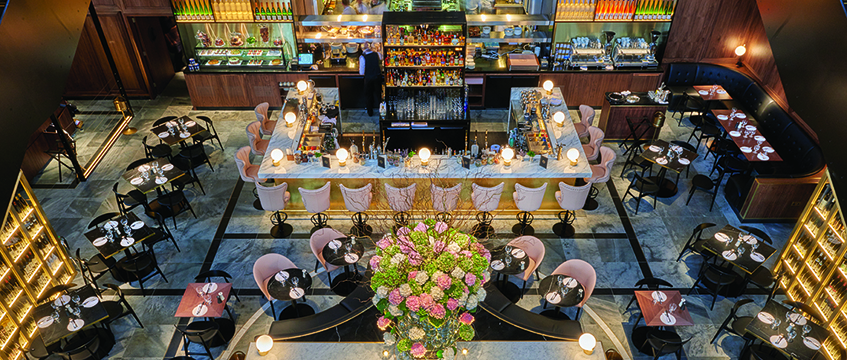
Unconventional spaces
Another of Gunewardena’s strategies is not to look at a site with a concept in mind. Rather he lets the space dictate the eventual theme. German Gymnasium, his venture with Argent at King’s Cross, N1, which opened in 2015, is a prime example.
The 10,000 sq ft space was constructed in 1856 as a purpose-built gym for the German Gymnastics society.
“It totally illustrates what we are about,” he says. “Most people would have looked at the building and thought ‘bloody hell, I’m not going to take that’ because of its size.”
And, to add to the risk, he decided on a German menu. “People just thought, “You’re nuts. Why would you serve German food?” he laughs.
But it worked. German Gymnasium is now one of London’s best-known restaurants and reported a 30% increase in profits at the beginning of this year.
Rather than trying to choose a particular new food trend or concept that he thinks will be popular, Gunewardena takes time in choosing the head chef for each site and then lets that dictate the menu.
“We never, ever think about food trends,” he says. “If you start spending your time looking for the latest hot thing, you’re probably not the sort of people to be creating the latest hot thing. We didn’t choose Nordic food because we are trying to jump on some Nordic food bandwagon – we did it because we have a Scandinavian chef and we thought it would be fun.”
All of D&D’s concepts and sites are meticulously designed, an element of the business which stems from when it was owned by designer Sir Terence Conran. Gunewardena and partner David Loewi bought out Conran Restaurants in 2006.
But despite the physical and fiscal investment that goes into each project, Gunewardena prefers not to buy freeholds. He would rather avoid locking his investments away in property so that his cash flow is fluid and ready to invest into the next site.
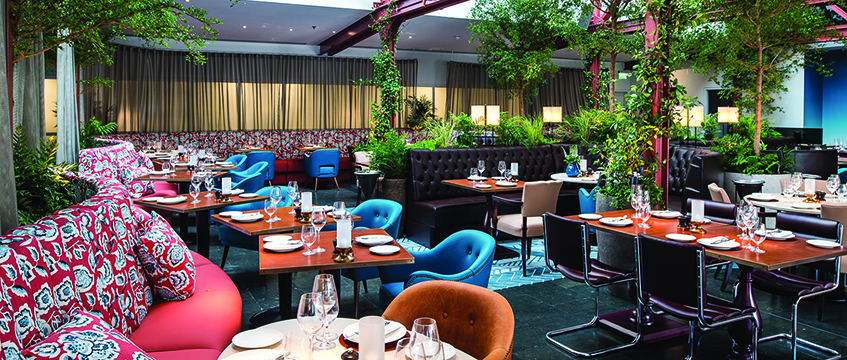
His restaurant sites range from anywhere between 2,000 sq ft to its 50,000 sq ft flagship Bluebird on King’s Road, SW6. One of his more recent deals is for a new 5,000 sq ft Bluebird Café, which opens this winter at Stanhope’s BBC Television Centre scheme in White City, W12.
He is planning on opening more branches of the Chelsea favourite. “But we’re not going to have 30 up and down the country,” he says.
There is also another D&D London hotel in the pipeline, though the process is still in legals so Gunewardena is unable to comment on a location at this stage. But he does reveal plans to expand into the hotel space more generally.
“There are two types of hotel which are doing very well – there is the no-frills CitizenM type and there is what we are trying to do, which is create hotels which are desirable because they have a great energy and that the bar is always busy – somewhere that is slightly more luxurious but not super luxury,” he says
Stateside ambition
Gunewardena has also set his sights on a resurgence in America, a market he has prior experience in – not all of it positive.
In 2000, when the business was Conran Holdings, it opened Guastivino’s and Club Guastivino underneath The Blackwell Island Bridge on the Upper East Side of New York. The venture struggled and was eventually switched to become an events venue.
“We found it very difficult to make profits, but now it is one of our best businesses,” says Gunewardena. “We understand how to do business in New York, but we haven’t opened a restaurant there for a number of years.”
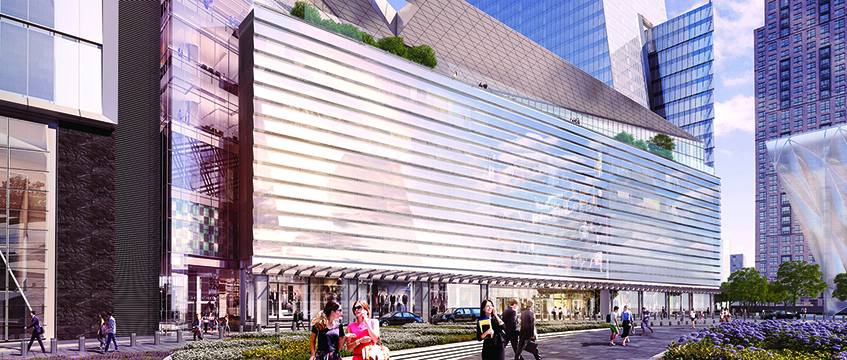
All that is about to change. D&D will open its second New York venture next year at the 1m sq ft retail and leisure pitch at Hudson Yards. The concept is yet to be revealed, but a US expansion, says Gunewardena, makes sense for a UK brand.
“If you watch the Eurovision song contest you will realise how incredibly unpopular the Brits are in Europe,” he laughs. “But they love us in America.”
The success of British steakhouse Hawksmoor at Westfield’s World Trade Center is testimony that many across the pond still perceive London as the dining capital of the world. But it is not just the popularity of British food with American palettes that has prompted him to set his sights on the international market.
He says: “Who knows what is going to happen to Europe and the UK in 10 years time. Maybe we are now going to have the same growth. We might not, which is why I am keen to diversify outside the UK.”
Social fabric
Similarly, Gunewardena is keen to expand outside London. D&D already has two sites in Leeds, and is planning two more – Issho and East 59th, which will open later this year, as well as its first restaurant in Manchester.
On the restaurant market more generally, he adds that as the UK retail market continues to battle the rise of e-commerce and wavering consumer confidence, it is more important than ever that landlords carefully consider their restaurant line-up, not just in shopping centres but also on the high street.
Fortunately for the restaurant sector, eating out looks set to remain on the menu.
“The fact is that people are spending more money on eating out than shopping,” he says.
“There are only so many dresses that you can have, but people just don’t seem to get enough of going out to meet their friends at a restaurant – it has become part of the social fabric of how we live.”
From accountancy to Aster: Gunewardena’s career in brief
Des Gunewardena was born in Sri Lanka and came to London with his family when he was seven years old.
He qualified as a chartered accountant with Ernst & Young in 1981 and in the mid-1980s was responsible for financial planning at Heron International.
He first became involved in the D&D business in June 1991, when it was known as Conran Holdings. He was made chief executive in 1995.
Led by chairman Sir Terence Conran, the group opened a string of restaurants across the capital, which became very popular and successful.
In September 2006, Gunewardena and managing director David Loewi led a management buyout of Conran Restaurants, though Conran retained a stake. They acquired 49% of the group in a deal that valued the company at £50m.
In 2007 the duo changed the name of the group to D&D London.
It now owns and operates 35 restaurants, with more openings expected this year.
D&D portfolio
Worldwide
- Alcazar, Paris
- Botancia, Tokyo
- Guastivinos, New York
- Iconic, Tokyo
London – West End, W1
- 100 Wardour Street
- Avenue
- Orrey
- Quaglino’s
- Sartoria
London – West
- Bluebird
- Kensington Place
- Launceston Place
London – Victoria
- Aster
London – Southbank
- Skylon
London – North
- German Gymnasium
- Radici
London – South
- Blueprint Café, Design Museum
- Cantina Del Ponte
- Le Pont De La Tour
- Butler’s Wharf Chop House
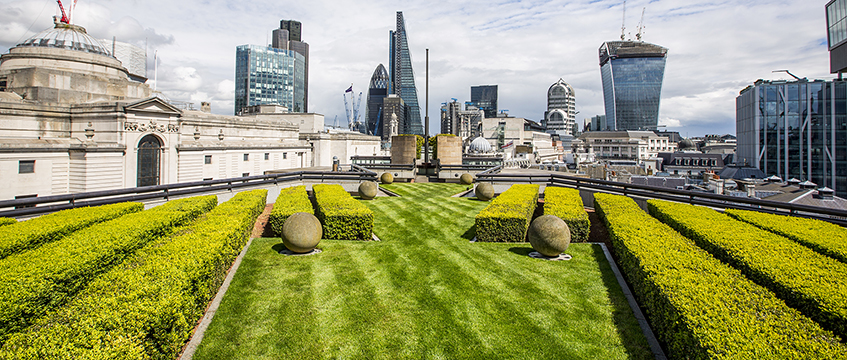
London – City
- Angler
- Coq D’Argent (pictured above)
- Fish Market
- Madison
- New Street Grill
- New Street Wine
- Old Bengal Bar
- Paternoster Chop House
- Royal Exchange Grand Café
- Sauterelle
- South Place Chop House
London – Canary Wharf
- Plateau
Leeds
- Angelica
- Crafthouse
Coming soon
- East 59th, Leeds
- Fiume, Battersea, SW11
- Issho, Leeds
- Concept to be revealed, Manchester Spinningfields
- Bluebird Café, BBC Televsion Centre
- Concept to be revealed, Hudson Yards, New York
To send feedback, e-mail amber.rolt@egi.co.uk or tweet @AmberRoltEG or @estatesgazette







